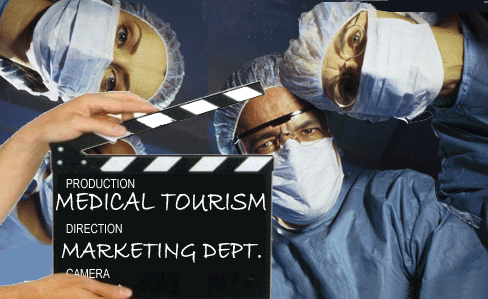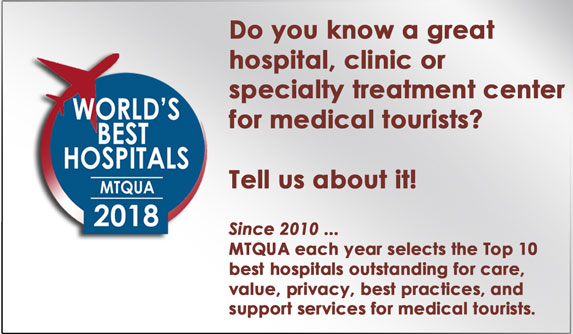 Would you let your travel agent choose your surgeon? Or how about a retired high school teacher?
Would you let your travel agent choose your surgeon? Or how about a retired high school teacher?
It sounds absurd but plenty of people do.
In the world of medical tourism, too many critical decisions about the safety of hospitals, surgeons and the procedures themselves are made by people with absolutely no expertise or specialized training in how to do so.
Some of the biggest names in the medical tourism industry are business professionals, not doctors or nurses, including Josef Woodman, who was paid to publish multiple titles about medical tourism in distant locations compiled from collected information.
What can medical tourists and consumers do about having an excellent, safe medical journey?
For starters, they can do the homework. This doesn’t mean checking to see what the weather is like or if there is a beach near your destination. It means knowing what to ask and what to look for behind the scenes, where patients usually are not allowed.
What can doctors, hospital managers and facilitators do to help medical tourists?
They can use these questions and observations as a map to providing better information, treatment and care management for their patients, clients and medical tourists.
If a prospective patient or client asked these questions of your practice or service, what answers would you give?
7 questions medical tourists must ask
1. Who is brokering the deal, and what are their credentials?
Is it a travel agent or a medical tourism company? Do they have any background in healthcare? Surprisingly, the answer is usually no.
2. Is the facility accredited or otherwise distinguished professionally?
Worry more about the facility and less about the cheapest option. Is the facility accredited? In fairness, even this process has its pitfalls. Pre-determined visitation schedules of the accreditation process bias the results. Some excellent hospitals refuse to be accredited. But accreditation is a good start.
Find out if the facility has the resources for your procedure, meaning if you are going for open heart surgery, do they have a designated cardiac surgery program, with specially trained doctors, nurses and equipment to care for you? Do they have a cardiac catheterization lab? Do they have a surgical intensive care unit? How many beds?
In several cases during hospital reviews I conducted, the answer was one (intensive care bed) and no specialized staff. Marble floors and gleaming lobbies are less important that a functioning CT scanner and a properly screened blood bank.
3. What verifiable information do I have about the surgeons?
Find out about the surgeons themselves. What credentials do they have? Then verify them online, if possible. Find out more about the surgeon at society sites and other international pages. Ask if you are guaranteed to have your procedure actually performed by this surgeon, so you don’t arrive to find out he is ‘out of town’ and someone else is performing your procedure.
4. Who wrote the testimonials?
For the most part, ignore testimonials. Testimonials are great hype, but they actually provide very little real information, either because they are unverifiable, or because the person providing the information doesn’t really know the information you are looking for. How do you know if this is a real patient? Or if they waded through 26 complaints before they found one or two people to say something nice?
Also, since patients are generally under anesthesia during most procedures, they can’t tell you if the operating room was clean, if the procedure remained sterile or if your surgeon left the room during your procedure for lunch while you were out cold and allowed the nurse to perform your breast augmentation. (All of these examples are taken from real circumstances).
5. How was the doctor recommended to the company?
Has a trained and unbiased observer watched the doctor perform the procedure? While an ‘on-the-job’ evaluation seems essential for many occupations, for some reason people think surgeons are exempt from this necessary evaluation. In fact, in the majority of cases, the brokers for the procedures have never even met the doctors they are representing.
How do these brokers know the doctor is a good doctor? Being willing to pay for referrals does not indicate surgical skill.
Only an intra-operative evaluation using internationally set criteria from World Health Organization or other esteemed body allows medical observers to judge the safety and likelihood of adverse outcomes. This gives unbiased reviewers a chance to see if the doctor follows accepted protocols for maintaining patient safety, surgical sterility, proper anesthesia management, infection prevention, and hemodynamic stability during cases.
Unfortunately few companies undergo a rigorous screening process. Foreign government embassies often use only a few testimonials and a written application for their seal of approval.
6. Is the procedure I am seeking illegal at home?
This has more than ethical considerations. There are valid health concerns with undergoing ‘experimental’ or quasi-experimental procedures far from home, in a country where you may have little to no recourse if these unproven treatments cause serious complications or even death. Various “detoxification” procedures, stem cell treatments for cancers and other unproven therapies may cause more harm than good, so use caution and good judgment.
7. How do I cancel?
Lastly, if you do chose a medical travel option and something seems shady when you arrive – cancel. Ask about the cancellation policies before you leave. A reputable company will offer a partial refund in situations like this.
There are many excellent facilities and options for patients all over the globe, but it’s important that consumers be savvy and use commonsense. Saving money is important but it’s not worth your life, or your good health.

 >
>
Pingback: Update on Medical Tourism in India | The Self-Pay Patient